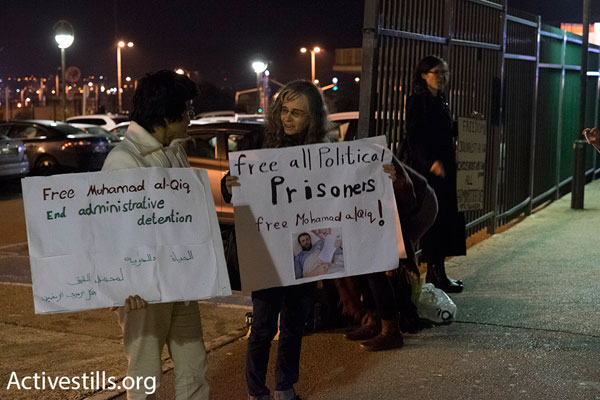The Supreme Court suspended Muhammad al-Qiq’s administrative detention order but won’t let him return to the West Bank; al-Qiq’s attorney says he will only accept medical treatement in a Palestinian hospital.
By Oren Ziv and Yael Marom

Palestinian journalist Muhammad al-Qiq is on day 77 of a hunger strike protesting his administrative detention, a practice Israel uses to imprison people without having to charge them or bring them to trial.
Al-Qiq is suffering from serious vertigo, has lost most of his sight and hearing, and can barely speak.
Since the High Court of Justice “suspended” his administrative detention last week he has been surrounded by supporters, activists and his legal team. The court did not, however, allow his release and refused to overturn his administrative detention order despite his serious medical condition.
Al-Qiq has said he will continue his hunger strike until he is fully released and allowed to return to the West Bank, where he will agree to medical treatment.
Attorney Hanan Khatib, who was by al-Qiq’s side when +972 Magazine visited him on Monday, reiterated that he is a journalist and that imprisoning him without charge or trial is illegal.
“The [High] Court suspended his administrative detention but unfortunately ruled that he must stay in the hospital in Afula (inside Israel),” Khatibi said.
Al-Qiq rejects that ruling, she added, saying that he will continue to refuse medical treatment until he is brought to a Palestinian hospital in the West Bank.
“He is dying right now,” Khatib added. “As the medical team has noted, he could die at any moment of a heart attack.”
Outside Emek Medical Center in Afula, a few Israeli activists stood demonstrating for al-Qiq’s immediate release from administrative detention. Protests in solidarity with al-Qiq have also taken place in the West Bank, Gaza Strip and elsewhere in the world in recent days.

According to reports in the Palestinian media over the weekend, negotiations to end al-Qiq’s hunger strike were accelerated in recent days due to his deteriorating medical condition. Israel, according to the reports, is offering to not extend his administrative detention beyond May 1, when the detention order already expires; al-Qiq rejected that offer.
Al-Qiq, 33, from the West Bank village of Dura near Hebron, worked as a reporter for the Saudi news channel “Almajd.” He was arrested on the night of November 21, 2015 when Israeli soldiers arrested him at his home. He was not allowed to make contact with either his wife or his attorney for many days.
Al-Qiq began his hunger strike four days after the beginning of his interrogation, when the latter reportedly understood that his interrogation was politically motivated. Sources close to Al-Qiq state that he was interrogated for “journalistic incitement,” and when he refused to cooperate, he was put in administrative detention for a period of six months.
The Shin Bet claims he is a member of Hamas who was previously jailed several times due to his activities in the organization. His current detention, according to the Shin Bet, came following “founded suspicions of involvement in terror activities with Hamas.”
He has not been charge with committing a crime. His attorneys are not allowed to see the evidence being used to justify his continued administrative detention.
Israel is currently imprisoning without charge or trial hundreds of Palestinians and at least one Jewish Israeli. The authority to issue administrative detention orders is drawn from pre-state colonial laws that are only valid as long as Israel is officially in a state of emergency, which it has been continuously since its establishment in 1948.
A version of this article first appeared in Hebrew on Local Call. Read it here.
